I was told that the word uppity has some racial connotations originating from the times of segregation in the South. I never thought of it as such. I kind of like the sound of the word but was wondering if it should be avoided in the presence of black people.
-
7I know you are asking this question in order not to cause offence, but perhaps one should avoid using racially offensive language in all contexts, not just around black people?– donothingsuccessfullyCommented Mar 24, 2013 at 8:24
-
6@donothingsuccessfully: this question is valuable precisely because uppity is not offensive language (racially or otherwise) but nonetheless will offend some people for historical reasons.– Tim LymingtonCommented Mar 24, 2013 at 14:17
-
2@TimLymington: Yes, it's a good question and I appreciate your distinction between offensive language and language people could be offended by.– donothingsuccessfullyCommented Mar 24, 2013 at 15:13
-
2While uppity might be described as a acting outside your class or caste, for basically all of US History there has only been one real social 'lower class' - African Slaves. African-Americans naturally dislike it, and the rest of the US dislikes any aspersion that one citizen is by fiat better than another.– OldcatCommented Nov 20, 2014 at 1:13
-
2It may be worth noting that in British English, "uppity" is rare and has no racial connotations. As an aside, "Mr Uppity" was a character in the children's "Mr Men" series of books. In all editions, his name was changed to "Mr Snooty" but this was done for the American market.– GreybeardCommented Dec 30, 2023 at 9:40
8 Answers
The first recorded use of uppity, according to the Online Etymological Dictionary, was in an Uncle Remus story about 7 years after Reconstruction ended (1873): "uppity (adj.) 1880, from up + -ity; originally used by blacks of other blacks felt to be too self-assertive (first recorded use is in "Uncle Remus"). The parallel British variant uppish (1670s) originally meant "lavish;" the sense of "conceited, arrogant" being first recorded 1734."
The standard collocation is "uppity [N-word]". This unfortunate history notwithstanding, it's an interesting and useful word, I think, to describe people who are too presumptuous and who exude the unjustified self-importance usually associated with the absurd contemporary notions some folks have about their social and intellectual equality in a spate of societies that falsely advertise their egalitarianism and commitment to "diversity".
The world is replete with pecking orders, at least one of which everyone belongs to and in which everyone has a place. Try to peck the hens above your station and you're uppity to them, no question about it. Your peers and others beneath your level in the pecking order might consider you a "pecking order hero" or a "freedom fighter" for daring to contravene convention, but most uppity folks are just like Bobby Riggs when push comes to shove: they're less than they thought they were and should not have acted as if they were better.
Given the history of the word, it is wise not to use it when it is more than likely to be considered racist and offensive, even if it's qualified to make clear that there's no racist or sexist connotation in your usage: those connotations can't be avoided. Use a synonym like presumptuous, audacious, cheeky, pretentious, or snobbish and you won't get into trouble for being politically incorrect, only for being critical.
-
2+1 For the sentence: "This unfortunate history ... and commitment to 'diversity'."– JimCommented Mar 24, 2013 at 3:36
-
7While I agree with the political commentary, it is out of place here. Answers should stay away from opinion and prescription.– MetaEdCommented Mar 24, 2013 at 5:00
-
11@ MετάEd: I can't disagree more. Language is inherently political. If it weren't, then no one would ask a question like this & anyone could say anything they want to say without having to consider consequences other than being misunderstood. That just isn't the way the world works. Prescription is necessary for discussions of usage. How else can one say that if you call your neighbor "ShitForBrains" because you think he's stupid, you might get shot or punched out? If you think that's not prescription, you're looking through rose-colored glasses. [To be continued]– user21497Commented Mar 24, 2013 at 6:35
-
5@MετάEd OP requests a prescription, as do most of the questions here; and opinion, grounded in observation and experience, is what most of our answers supply. Even citing an outside source constitutes an opinion respecting that source's reliability and authority. Commented Mar 24, 2013 at 7:56
-
5@StoneyB I think that MετάEd's main contention was that the answer went off-topic and strayed on to broader social commentary. Commented Mar 24, 2013 at 8:41
Dictionaries do not note any derogatory connotations while etymonline states that uppity was first used by blacks of other blacks. But apparently, it is considered to be a racist term—at least by some—in the US.
The adjective's history has come into focus a couple of times in the last few years. According to an article in the Chicago Tribune,
The word has popped up before in the Obamas' life. During the presidential campaign in September 2008, Rep. Lynn Westmoreland, a Georgia Republican, touched off a firestorm by saying the Obamas looked to him as though "they're a member of an elitist class ... that thinks that they're uppity." Westmoreland later defended himself in a revealing public statement. He had "never heard that term used in a racially derogatory sense," he said, in the mill town where he grew up. For a Georgia native of his years, a lot of folks found that hard to believe.
In November 2011, it was Rush Limbaugh's comment which stirred things up once again:
But this time it was reports of the first lady traveling occasionally on a separate plane from her husband that lit Limbaugh's fuse. "NASCAR people understand that's a little bit of a waste," he said. "They understand it is a little bit of uppity-ism."
There's the word. Dictionaries define the word as "arrogant," "presumptuous" and "putting on airs of superiority." But it also has strong connotations in this country's cultural history as a description for blacks who, in the view of white society, don't know their place.
A language blog over at The Baltimore Sun covers the racist connotations of uppity in great detail. The author cites the following excerpt from the OED:
“1952 F. L. ALLEN Big Change II. viii. 130 The effect of the automobile revolution was especially noticeable in the South, where one began to hear whites complaining about ‘uppity [you know which epithet I’ve deleted]’ on the highways, where there was no Jim Crow.”
He also does not believe that the racist overtones are dated and notes its relatively recent employment by a member of the US supreme court.
And, perhaps most notably, you may recall this passage from Clarence Thomas’s confirmation hearing:
"And from my standpoint, as a black American, it is a high-tech lynching for uppity blacks who in any way deign to think for themselves, to do for themselves, to have different ideas, and it is a message that unless you kowtow to an old order, this is what will happen to you."
If you still think that uppity carries no racial charge, perhaps you could ask Mr. Justice Thomas what he thinks.
I guess that this should be enough reason to avoid using uppity in the presence of African Americans and specifically, to avoid using it to describe them.
-
2+1 for your research & excellent selection of commentary, but please remember that sentences like your last one constitute prescription, which some folks think is verboten around here. And perhaps your penultimate sentence is political commentary, another no-no for some. Not for me, however. I think this kind of information's necessary to understand the whys and wherefores of usage.– user21497Commented Mar 24, 2013 at 7:10
-
3I just asked my African American friend from Texas (he also lives here in Taiwan) for his opinion about this, & he confirms that if someone uses that term to describe African Americans, it's racist, no matter who or what the user is.– user21497Commented Mar 24, 2013 at 9:54
It was quite common, and not only in the South, for white people to characterize as uppity black people who were simply asking to be treated as equals. It has also been used that way to describe women in similar circumstances. Indeed, I suppose some people still use it so. I would not avoid the word entirely on that account, but I would never use it of a person of color or of a woman, even if it were strictly accurate to do so, lest my meaning be misunderstood or lest, even if my meaning were not misunderstood, painful associations should be gratuitously dredged up.
'Uppity' in glossaries and dictionaries
James Harrison, "Negro English," in Anglia: Journal of English Philology, volume 7 (1884) includes "uppity" as one of seven expressions in contemporaneous Black U.S. speech that relate to forms of impudence or presumptuousness:
To kick up shines = to be proud, to put on airs.
To sling sassy words at = to be impertinent to [with related phrases "To look sassy," "To flip yo' sass at," and "To sling yo' jaw at"].
Hifalutin' fokes = 'toploftical' people
To be stuck up = to take on airs.
Uppity = pert;
To git de swell-hededniss = to put on airs.
To tech de fancy fling (in dancing) = to try to put on airs.
Harrison lived in Lexington, Virginia, and the region that his study covered ranged from east to west from the Eastern Seaboard to the Mississippi River, and north to south from the 39th parallel (the Mason-Dixon line) tot he Gulf of Mexico.
According to the 1886 edition of Merriam-Webster's An American Dictionary of the English Language (first published in 1864), pert as an adjective had two obsolete meanings ("Lively; brisk; smart" and "Open; evident; plain; apert [defined as "Open, evident, undisguised"]") and one current meaning ("Indecorously free, or presuming; forward; saucy; bold; impertinent; impudent").
The same dictionary has entries for uppish ("Proud, arrogant; assuming; putting on airs of superiority," labeled as a colloquial expression) and uppishness ("The quality of being uppish; pride or arrogance of manner"), but not for uppity. In fact, Merriam-Webster doesn't include an entry for uppity until the Seventh Collegiate Dictionary (1963):
uppity adj {prob. fr. up + -ity (as in persnickity, var. of persnickety)} : ARROGANT, PRESUMPTUOUS — uppitiness n
The fact that uppish made the cut as a colloquial form for decades before uppity received an entry suggests that MW viewed uppity as a dialect word rather than as a colloquialism.
Early occurrences of 'uppity' in the wild
A number of instances of uppity appear in published writings of the late 1870s and the 1880s.
From Bill Arp, "What Feltonites Are Made Of," in the Dublin [Georgia] Post (October 23, 1878), reprinted from the Atlanta [Georgia] Constitution:
Well there's another class of people that's supportin the parson [Dr. Felton]—the dissatisfied complainin sort—them what's bigoty and uppity and finiky; who think they know more about everything than anybody else and won't work except in lead and won't pull a pound even there. but want to prance along and blow off and make a big show, and if you don't humor 'em they sorter pout and go off on somwe other shoot.
From Mrs. Arp, "The Madame Pays Her Respects to 'That Husband of Hers',"(https://gahistoricnewspapers.galileo.usg.edu/lccn/sn89053704/1879-04-29/ed-1/seq-2/#sort=date_asc&index=3&rows=12&proxtext=upity&sequence=0&words=upity&page=7)," in the Atlanta [Georgia] Constitution (April 29, 1879):
Mr. Arp is jest a little too upity for his raisin. He's gettin purnickity cause away from home everybody thinks he's perfecshun perfectorfied, but they am mighty mistaken about that.
From Bill Arp, "Things in General," in the Eastman [Georgia] Times (January 19, 1880), reprinted from the Atlanta [Georgia] Constitution:
I've got no use for these pompous military men[.] They are too bigoty. They are too uppity. They have had their own way so long they have no restraints or respect for the law. I dont want any of em for president. I am willing to take Judge Lochrane; but I wont take General Grant if I can help it.
From Joel Chandler Harris, "The Fate of a Tattling Birrd," in the Atlanta [Georgia] Constitution (March 16, 1880):
"... You 'member w'at 'come er de bird w'at went tattlin' 'roun' 'bout Brer Rabbit?"
The little boy didn't remember, but he was very anxious to know, and he also wanted to know what kind of a bird it was that so disgraced itself.
"Hit wuz wunner deze yer uppity little sparrers, I speck," said the old man; "dey wuz allus bodder'n' longer udder fokes's bizness, en dey keeps at it down ter dis day—peckin' yer, and pickin' dar, en scratchin' over yander. ..."
From Joel Chandler Harris, "Brother Rabbit and His Famous Foot," in Nights with Uncle Remus (1881):
"Dar, now!" exclaimed the old man, indignantly, "'Tildy dis en 'Tildy dat I dunner w'at yo' mammy dreamin' 'bout fewr ter let dat [Black] gal be a-holl'in' en a-bawlin' atter you all 'roun' dish yer plan'ation. She de mos' uppity [Black person] on de hill, en de fus' news you know dey ull all hatter make der bows en call 'er Mistiss. ..."
From Joel Chandler Harris, "The Fire-Test," in Nights with Uncle Remus (1881):
W'en de fier 'gun ter blaze up, Brer Tarrypin' 'low dat de creeturs mus' jump 'cross dat, en de man w'at 'stroy Brer Rabbit chilluns will drap in en git bu'nt up. Brer Wolf bin so uppity 'bout diggin', en fillin', en kindlin', dat dey all 'spected 'im fer ter make de fus' trial ; but, bless yo' soul en body! Brer Wolf look lak he got some yuther business fer ter ten' ter.
From Bill Arp, "In Which He Dilates upon Florida and Her People," in the Atlanta [Georgia] Constitution (February 8, 1881):
The steamboat trip up the St Johns is worth all the money. The boats are comfortable and the officers kind and you soon get acquainted with the passengers, except the stuck-ups, or as Mrs. Arp would say, the uppity and bigoty, and you can enjoy yourself all the day long.
From Bill Arp, "He Turns His Attention to Politics and Preachers," in the Atlanta [Georgia] Constitution (October 28, 1884):
I heard of a clerk once in a dry goods store who was smart and quick and a splendid manager, and all that, but he got uppity and biggoty, and put on consequential airs until he was very disagreeable, and he took occasion to say to his associates that the concern couldn't get along without him.
From "Uncle Ish: Under Heroic Treatment," in the Hartwell [Georgia] Sun (February 14, 1885):
"Sum uv dese uppity clerks 's gwinter gi da heads broke if da don't quit prankin wid me, jes' sho'.
From "She Wanted to Smoke," in the Wrightsville [Georgia] Recorder (March 18, 1886):
Presently Conductor Matthews came rushing through the [train] car exclaiming: "Who pulled that bell-line?"
"I did," impatiently replied the old lady.
"Well why did you do it, and what do you want?" snapped Tobe fretfully.
"Well, you can bring me a match, I want to light my pipe, and you needn't git so uppity 'bout me pullin' ther rope, nuther!"
From Bill Arp, "In Which He Gives the Farmers Some Good Advice," in the Eastman [Georgia] Times (July 29, 1886):
The children's crops are doing fine—the watermelons, and goobbers and popcorn. These children are getting uppity and bigoty and monopolize my attention and keep Mrs. Arp busy. She is making some homespun bathing suits for them now.
From Mrs. Schuyler Crowninshield, The Ignoramuses: A Travel Story (1887):
"Why Rosie unpacked such a thing [indelible ink], or even brought it among my medicines, is a mystery to me. Pooe boy! I am so, so sorry."
"De bes' t'ing fer you, Mass'r Cortland." Rosie's black head with its neat white turban protruded through the door. "Teach ye not to be so uppity. Anybody who'd go and tie—"
"Take Master Tom down to the wharf, Rosie," said Mrs. Gordon, cutting short this monotonous complaint.
From Jessie Glasier, "Ole Mammy Prissy," in St. Nicholas, volume 14 (October 1887):
"...Chile, I'se fru workin' my ole bones stiff gedd'rin' pussimmons an' chink-pins, an diggin' fer sass'fras. Ain' goin' t' set out dah no mo', now I tell ye, mohnin' in an' mohnin' out, an' 'Wat'll ye buy, Lady?'—er, 'Yer's yer fine fresh vi'lets, Lady'—er it mighrt be aigs, er blaclbe'ys, in season—an den see um march by lookin' so uppity, makin' out dey don' nubber year de ole woman, no mo 'n ef she's bohn 'dout a tongue!"
From "A Bad Place for Store Clothes" in *Clothier and Furnisher* (April 1888):
The penalty of wearing store clothes in Rabun county, Ga., is death. Some time ago the murder of William Thomas in that county was first reported. One of the murderers tells a curious story as to why the murder was committed.
"Thomas came cavorting up to the church," said he, "a wearin' store clothes. Us boys did not like to see him taking the shine off us. Sp we concluded to have a little fun. We axed him to take a drink, but he was too uppity to do it. My brother then threw a stone at him to see how he would run, and he run, sure enough. Then we both ran after him, throwing stones after him, thinking it was fun, when suddenly he dropped down dead. If we had not been drinking we would not have done what we did. My brother is to be hung on the 11th of may and I am now going to the coal mines for life. I reckon I will get used to it. I will try anyhow. But I never did like a man what wore store clothes."
Rabun County is at the northeast tip of Georgia, bordered to the north and the east by South Carolina. Although race is never mentioned in this brief account, the circumstances indicate that both the killers and the victim were White. First, contemporaneous newspapers considered race a significant framing element in any such story unless all of the people involved were White, in which case their race was assumed sub silencio. Moreover, if either the victim or the attackers (or both) had been Black, it seems quite likely that the penalty meted out at trial would have been different (death for both, assuming that they received a formal trial at all, in the Black-on-White scenario; limited prison terms, at most, in the White-on-Black scenario; and life imprisonment, at most, in the Black-on-Black scenario).
Discussion
The two authors who dominate the early occurrences of uppity are Bill Arp (the pen name of Charles Henry Smith) and Joel Chandler Harris. Smith was born in Lawrenceville, Georgia, and Harris in Eatonton, Georgia. Both towns are in north central Georgia and are separated by just two counties.
Smith, who uses the word in print as early as 1878, consistently pairs uppity with biggoty, indicating that acting higher-class than one actually is pairs naturally with acting like a bigger (more important) person than one actually is. The object's of Smith's condemnation for being uppity are (in chronological order) supporters of Dr. Felton, a political opponent; "Mr. Arp" himself, as asserted by "Mrs. Arp"; pompous military men (including Ulysses Grant); stuck-up passengers on steamboat excursions; a dry goods store clerk; and his children. Additional instances in Smith's columns from later in the 1880s attribute uppitineess to "my young friends" (December 28, 1886); "Mr. Arp" again, as asserted by his father when Bill was a young man (September 3, 1887), successful town merchants (November 29, 1887); U.S. states to the west of the Eastern Seaboard Southern states (February 14, 1888); Judge Thurman, another political opponent (June 12, 1888); and "college boys" (July 20, 1889). None of these instances involves anyone who is obviously (or even likely) Black. It follows that, at least at in the early days of its published use, the expression was probably racially neutral.
The first published instance where uppity is used to describe a Black person is in the lead-in to Harris's 1881 tale "Brother Rabbit and His Famous Foot." The character who offers that description is Uncle Remus, who also uses the word elswhere to characterize sparrows (in 188o), and Brer Wolf (again in 1881).
Other early instances of uppity in the wild use the term to describe clerks (in the voice of a Black character), a train conductor (attributed to an old White woman from the countryside), a White child (in the voice of a Black maid), shoppers and other passers-by (in the voice of a Black vendor), and a young White man wearing store-bought clothes (attributed to a White assailant).
It is interesting that a study of "Negro English" published in 1884 identifies uppity as a term used in contemporaneous Black speech, but it is not clear from the earliest recorded instances of the term whether it originated among Black Georgians or among rural White Georgians. The distinction may be artificial in any case, since both Black and White people in northern Georgia appear to have been using the term from a very early date in its recorded existence; but the extreme bias in favor of White sources during the period in question means that the word might have been in use in Black households for years or even decades before White speakers picked it up or White writers bothered to write it down.
The earliest Google Books match for "uppity [Black person]" as a category or type, rather than as a personal characterization (as in Harris's use of it) is from 1922—and already the expression is treated as an accepted set phrase or trope. From George Harrington, The Plebian Pestilence: A Small-pox Interlude (1922):
Phil, the driver of the motor-car by which their meals, mail and express parcels were brought, was mildly irritating. It is doubtful if he intended to be so, but he was an "uppity [Black person]," to use a Southern phrase: he had spent two or three seasons in the North, and been upset thereby. He felt important: he was "familiar": he over-indulged an unfortunate tendency to talk—and his talk was rather obnoxious.
And from Ian Cameron, "Negro Songs," in The Musical Times & Singing-class Circular (June 1, 1922), a British periodical:
These songs may be heard to-day all over the southern part of the United States. When they pass (may the day be distant!) and a new 'uppity' negro supplants the old, I am firmly convinced that he will be less happy, less prosperous, and far less educated in the good manners of the heart.
It thus appears that, by 1922, "uppity [Black person]" was a stock phrase in some parts of the U.S. South to describe a Black person who didn't behave in accordance with the submissiveness and circumspection that White Southerners expected.
More than a century of invidious, categorical use by White speakers and writers of "uppity [Black person]" has poisoned uppity as a defensibly nonracial term as applied to anyone who happens to be Black; it is also, although perhaps to a lesser degree, a loaded term when applied across—or even within—racial lines, whether categorically or not. I wouldn't use it in conversation ever.
During that acrimonious period during the divorce process my now ex-husband called me uppity. We are both white but my outrage came from my understanding of the origin of the word and how that meaning would apply to the husband/wife relationship. To me it clearly meant that he considered himself my superior and my inferior status entitled me to nothing unless he deigned to give it. He was totally surprised at my outraged reaction. I have no idea what he thought it meant but his words and actions clearly showed I was right on the nose. It is difficult for me to imagine a benign or neutral meaning for the word.
Can anyone see the irony in this? By the very nature of using this word with someone, the user implies they are "better" than the person they are talking to. I find this hilarious.
I am a black American who is a Canadian resident. A police Constable called me "uppity" because I had the unmitigated gall to tell her that I did not want my child left at a home where someone was emotionally abusive towards him. Her response, "I'm sick of your uppity attitude."
I was disgusted. So, I am stepping outside of my station how? I was being arrogant how?
BTW - The party line tends to be Canadians are not racist. While most Canadians I have met have not been racist towards me...this officer was.
When stating that "uppity" is a term "blacks" used to refer to other "blacks", it is incredulous that the word is taken as canon since J.C. Harris is a fiction writer and folklorist. Was Harris truly an authority on slave language? Regardless, in the 1800s, blacks tended to borrow vocabulary from their owners. Ultimately, "uppity" is a term invented by J.C. Harris to depict language he believed was used by blacks in his story to describe other blacks.
Uppity is a degrading word to anyone it is directed towards.
-
1The incident you report is not really authoritative in answering the question. It seems to merely a bald statement that "uppity" does have offensive racial connotations. Commented Dec 30, 2023 at 23:12
Uppity is an attributive modifier or noun adjunct as the essential meaning of the word is inherently linked to the object described. Beyond connotation, the denotative logic of the derogative makes it unique in how it specifically references Blacks and other individuals with black adjacency--often, women.
A quick Google Ngram search is an objective large sample, longitudinal approach to measuring the progression of racist and sexist attitudes across U.S. American history. Inputting the word "uppity" measures the frequency and contexts of the lexical item across the corpus of English book publications. The usage of uppity is a modifier for any aspect of Blackness that understands itself as on the same par with whiteness, which is seen as an absurd notion according to the racialogics of white supremacist global hegemony. 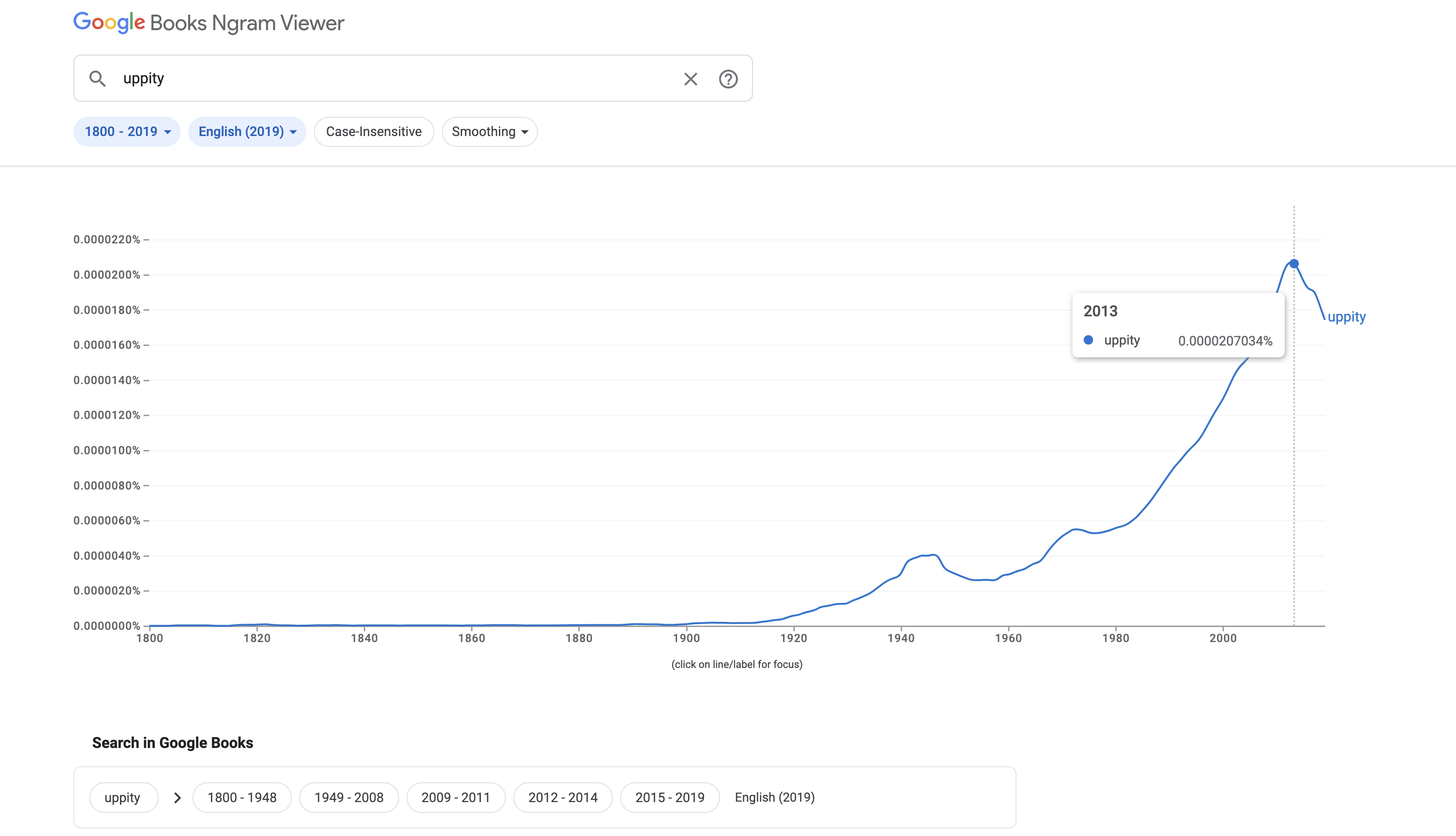
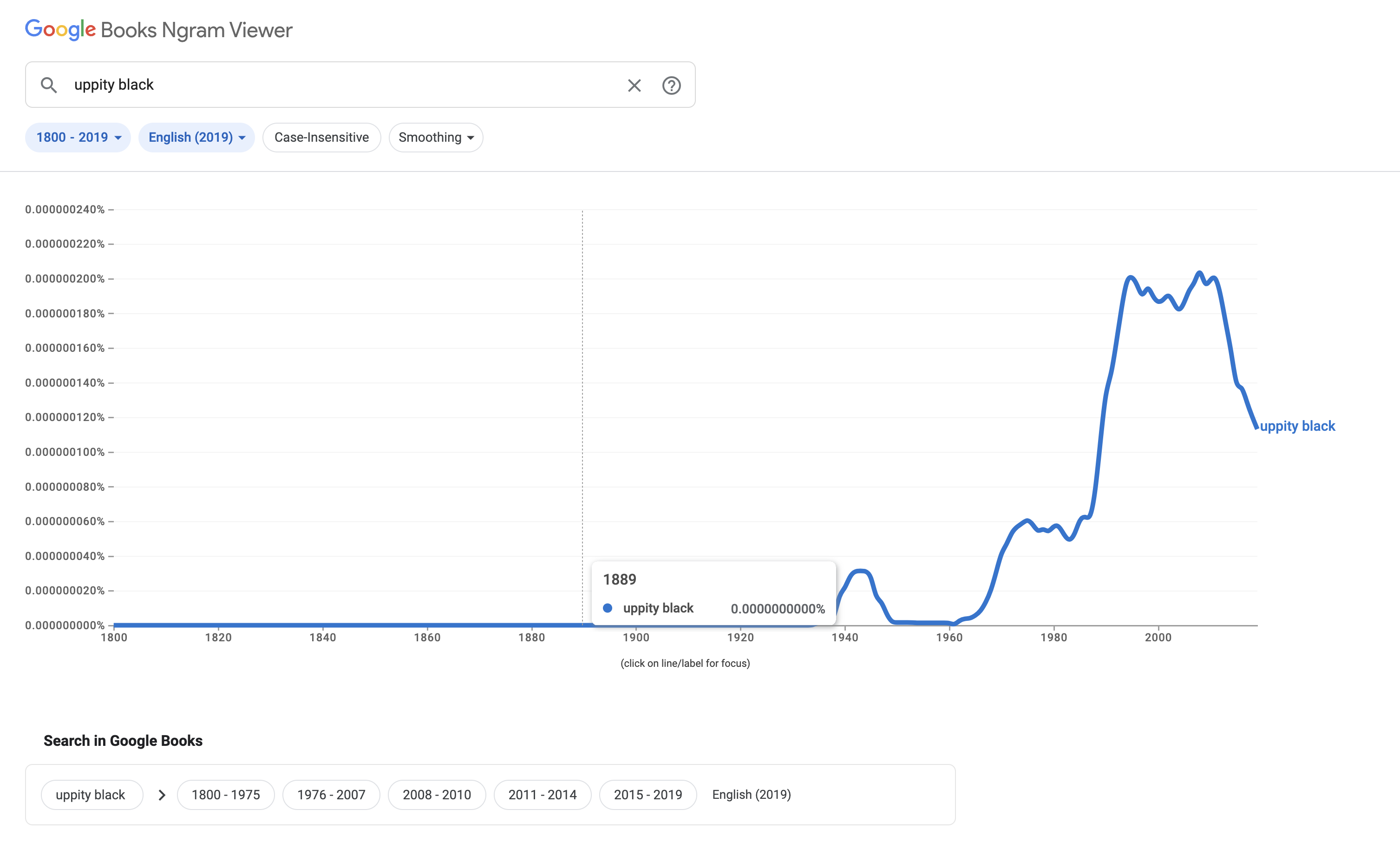
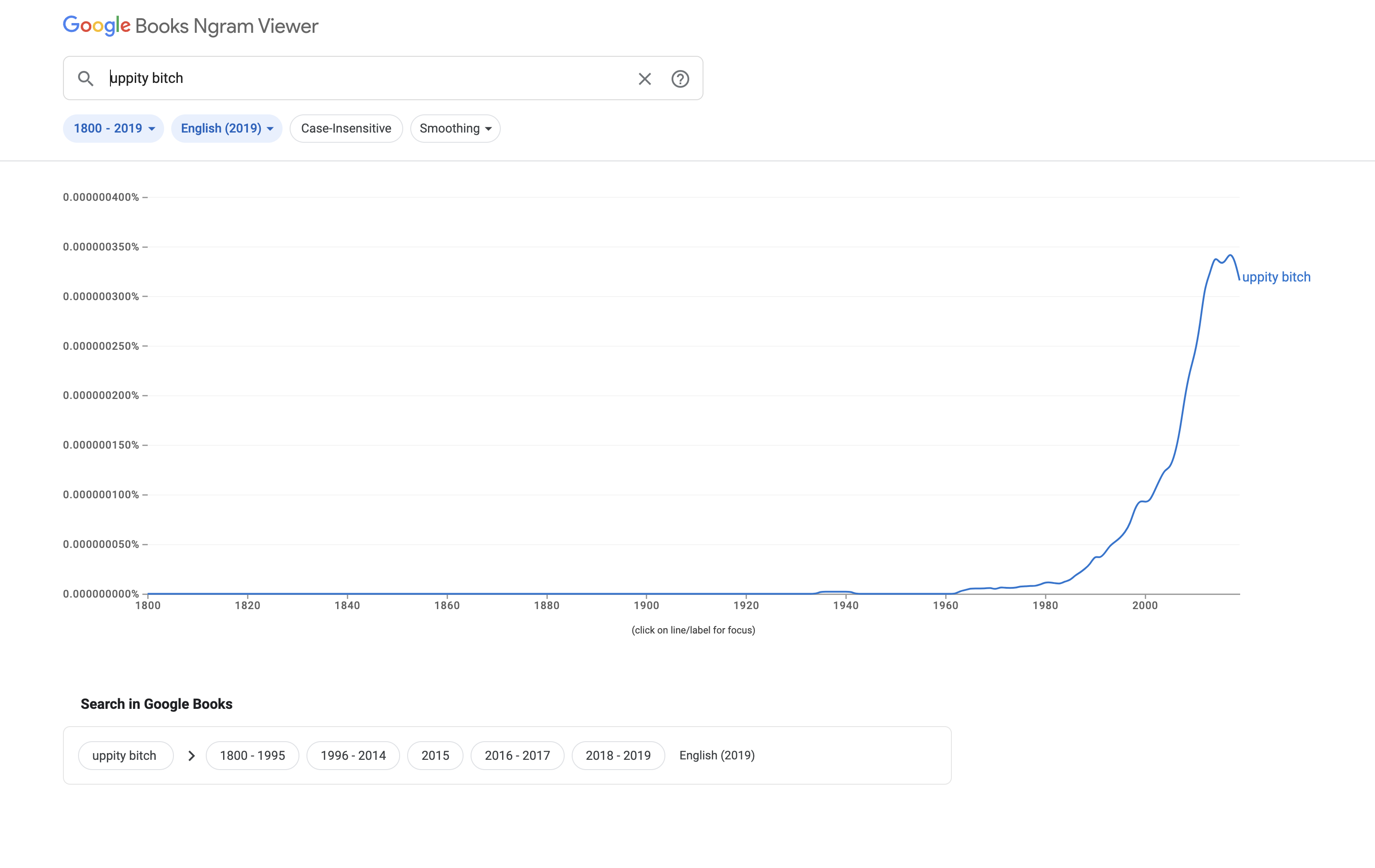
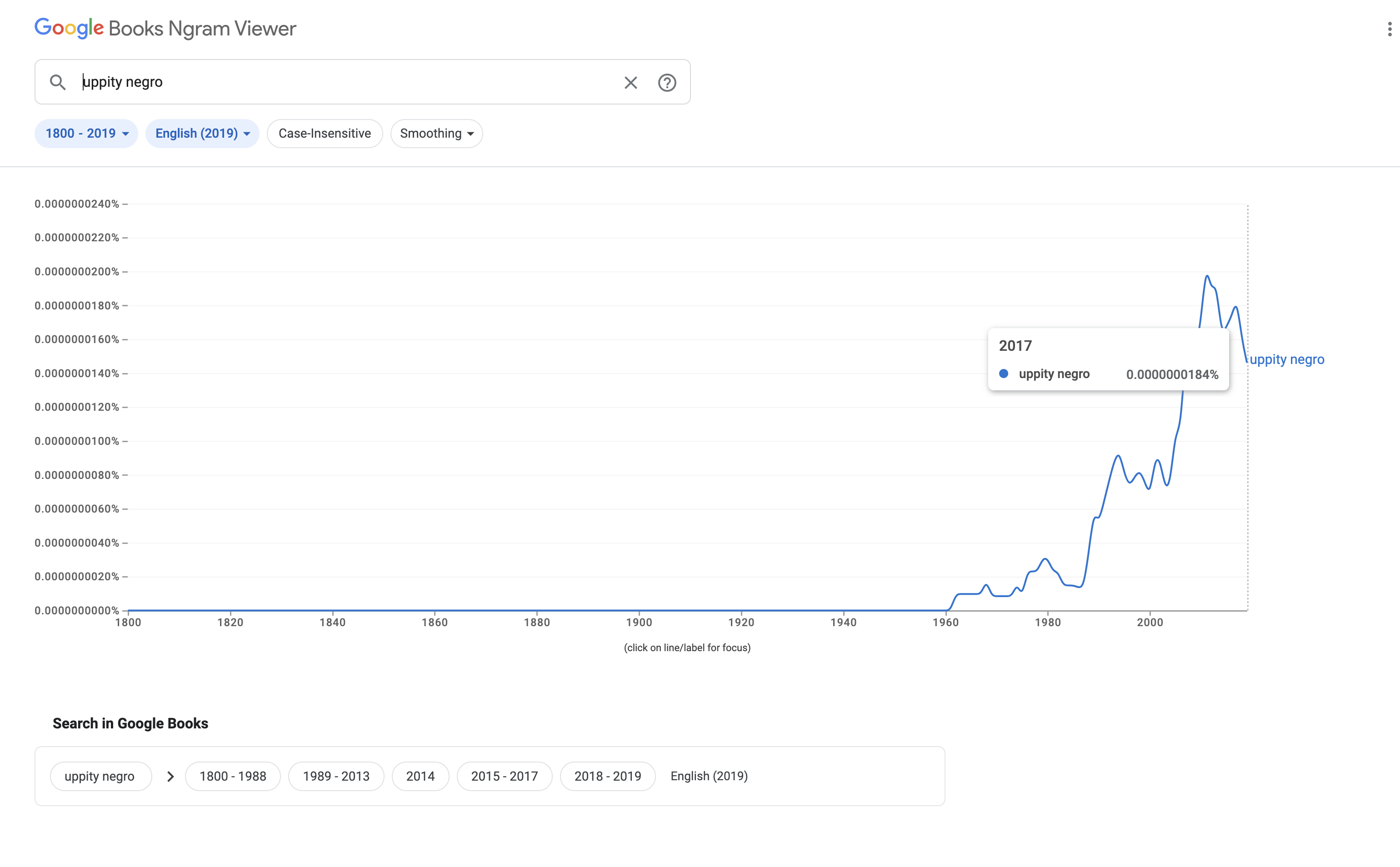
As the visualizations show, historical upticks in usage reflect general white racial attitudes as to whether or not black people are staying in their ostensible place at any given time. The word increased in popularity during Reconstruction, proliferated during Jim Crow and the Civil Rights Movement, waned through the golden years of Hip-Hop, and exploded in the Obama era leading into the Trump years.
Additionally, the graphs below trace how uppity is conjoined with the lexical items "black" + "bitch" to identify the sudden and conspicuous surge of Black women entering the industrial workforce en masse during WWII. Several decades later, a semantic inversion of "uppity" is combined with "white," coinciding with sentiments associated with the post-racial ironic sentiments as characteristic of the Obama years (slightly dropping at the start of Trump's administrative succession), although with far less frequency than its original counterpart phrase. counterpart phrase.
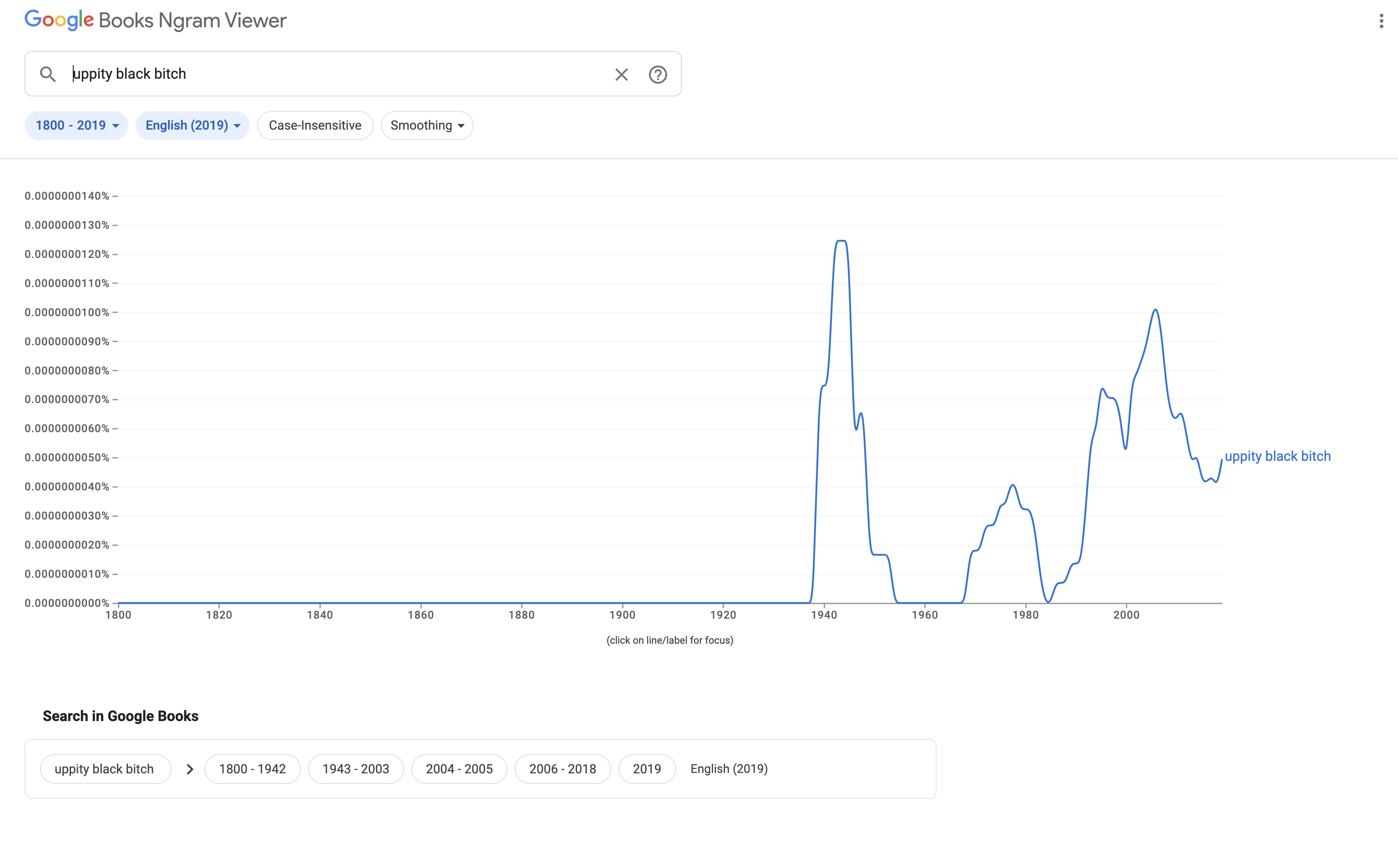
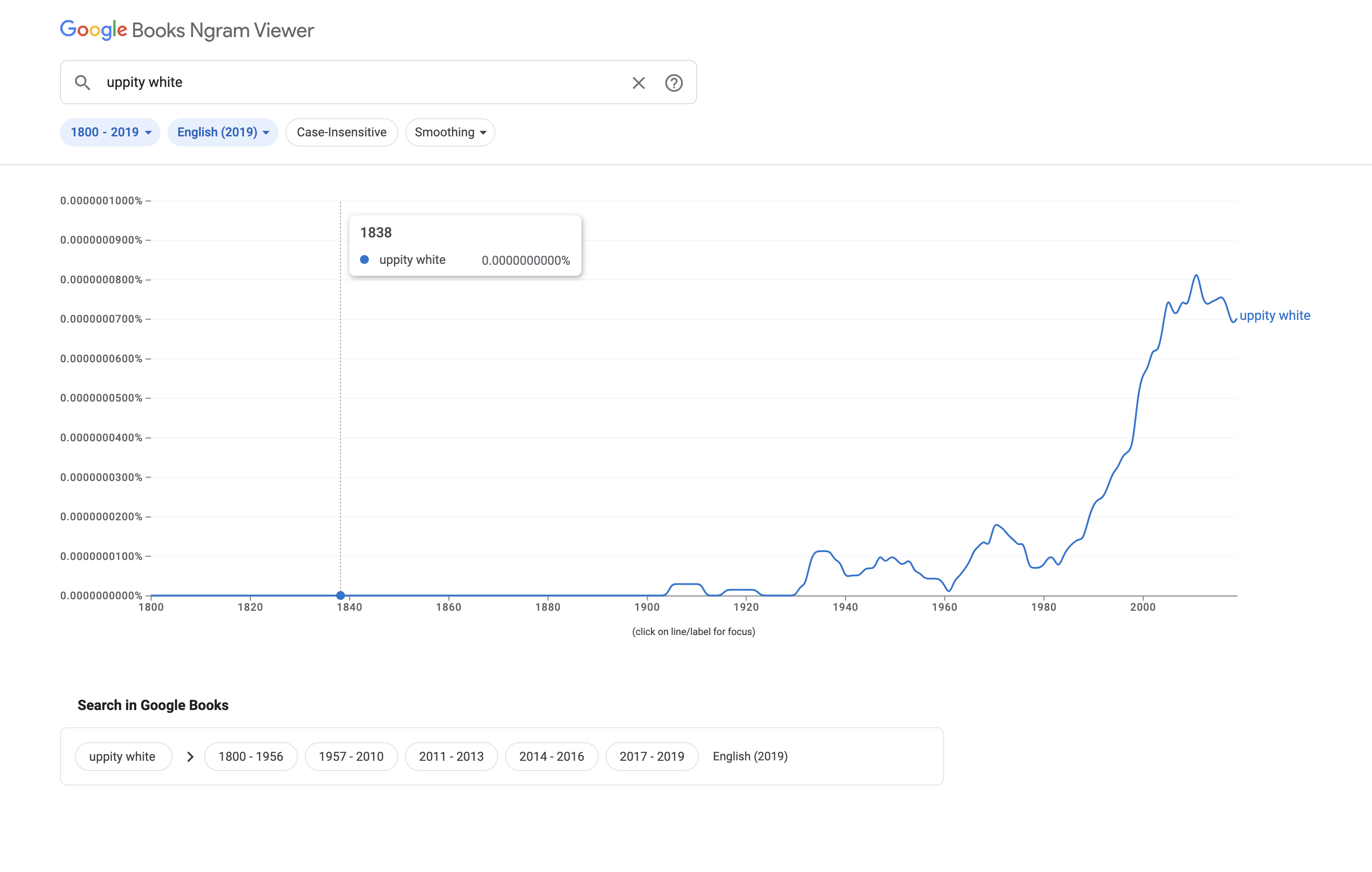
So, the answer to your question is no. It is not okay to use the expression, neither "in the presence of black people," nor away from their presence because you know, like... racism.
Uhh duh.
-
Your answer could be improved with additional supporting information. Please edit to add further details, such as citations or documentation, so that others can confirm that your answer is correct. You can find more information on how to write good answers in the help center.– Community BotCommented Dec 28, 2023 at 19:47
-
1As it’s currently written, your answer is unclear. Please edit to add additional details that will help others understand how this addresses the question asked. You can find more information on how to write good answers in the help center.– Community BotCommented Dec 28, 2023 at 21:51
"Uppity" suggests that someone is acting as if they have rights that the speaker doesn't think that they in fact have. It implies that the speaker considers themselves to be of a higher social status than the object of discussion, and is criticizing the object of discussion for failing to acknowledge that. This is distinct from "arrogant", which implies that the speaker believes that the object of discussion believes themselves to be above other people. "Arrogant" is about someone thinking they should be treated better than others, while "uppity" is about someone thinking they should be treated the same as others.
Black people are of course one of the primary candidates to be considered to be lacking rights, but even without the racial component, implying that some people have less rights than others is not a good thing to be doing.
